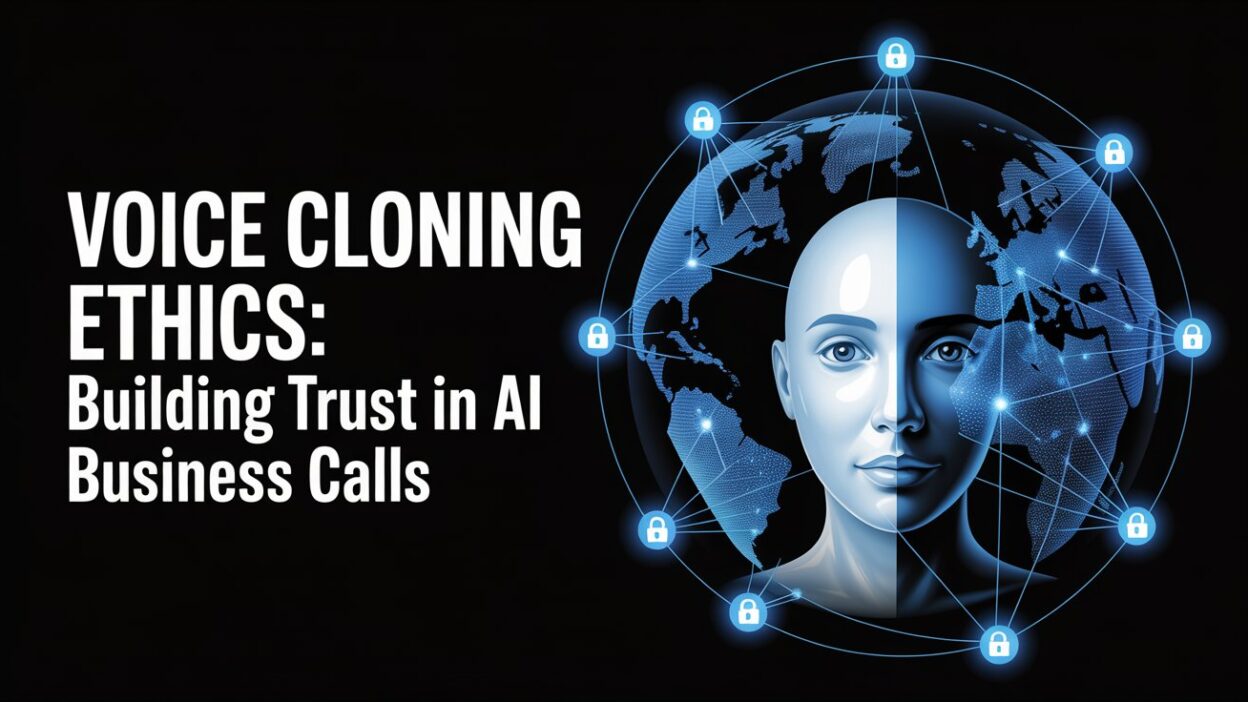The rapid advancement of artificial intelligence has brought changes to how businesses communicate with customers, partners, and stakeholders. Among these innovations, AI-generated speech for business calls has emerged as a powerful tool that promises to transform customer service, sales interactions, and internal communications. However, with great technological power comes equally significant ethical responsibility.
Table of Contents
As organizations increasingly adopt AI-generated voice for business calls, the conversation around ethical implementation becomes more critical than ever. This technology, which can replicate human voices with startling accuracy, offers tremendous potential for enhancing customer experiences, reducing operational costs, and scaling business communications. Yet it also raises profound questions about authenticity, consent, privacy, and trust, the very foundations upon which successful business relationships are built.
Understanding AI Voice Cloning Technology in a Business Context
AI voice cloning for business calls represents a sophisticated application of machine learning and neural network technologies. At its core, this system analyzes voice patterns, intonations, speech rhythms, and linguistic characteristics to create synthetic versions of human voices that can deliver scripted or dynamically generated content during business interactions.
The technology works by processing extensive audio samples of a target voice, learning the unique acoustic fingerprint that makes each person’s speech distinctive. Advanced algorithms then generate new speech that maintains the original speaker’s vocal characteristics while delivering entirely new content. For businesses, this means the ability to create consistent, personalized communication experiences at scale.
Companies are implementing AI-generated speech for business calls across various applications. Customer service departments use it to maintain a consistent brand voice across different representatives and time zones. Sales teams leverage the technology to personalize outreach efforts while maintaining efficiency. International businesses employ voice cloning to deliver communications in multiple languages while preserving the familiar voice of trusted company representatives.
The technical capabilities continue to evolve rapidly, with modern systems capable of generating highly realistic speech that can be difficult to distinguish from human voices. This advancement brings both opportunities and challenges, making ethical considerations not just important but essential for responsible business implementation.
The Ethical Landscape of Voice Cloning in Professional Settings
The ethical implications of AI voice cloning for business calls extend far beyond simple technological considerations. They touch the very heart of human communication, trust, and authentic relationship-building that form the backbone of successful business interactions.
Authenticity and Transparency Concerns
One of the most significant ethical challenges involves the question of authenticity. When businesses use AI voice cloning for business calls, they must grapple with fundamental questions about disclosure and transparency. Should customers always know when they’re interacting with an AI-generated voice? How does the use of synthetic voices affect the perceived authenticity of business relationships?
The authenticity concern becomes particularly complex when considering that human communication relies heavily on trust and genuine connection. Customers and business partners expect honest, transparent interactions. When AI voice cloning for business calls becomes indistinguishable from human communication, businesses face the ethical imperative to maintain honesty about the nature of these interactions.
Consent and Permission Issues
Another critical ethical dimension involves consent and permission. Traditional AI voice cloning for business calls often requires extensive voice samples from real individuals. This raises important questions about who owns these voice patterns, how they can be used, and what permissions are necessary before implementing voice cloning technology.
Employees whose voices are cloned for business purposes must understand how their vocal identity will be used, stored, and potentially modified. Similarly, customers interacting with cloned voices have the right to understand the nature of their communication experience. The ethical framework must address both explicit consent from voice donors and informed consent from communication recipients.
Privacy and Data Security Implications
The implementation of AI voice cloning for business calls creates new categories of sensitive data that require robust protection measures. Voice patterns represent biometric information that, once compromised, cannot be changed like passwords or other security credentials. Businesses must therefore implement stringent security measures to protect both the source voice data and the synthetic voice generation systems.
Privacy concerns extend beyond simple data protection to include questions about voice ownership, usage rights, and the potential for misuse. Companies must establish clear policies about data retention, usage limitations, and deletion procedures for voice-related information.
Building Ethical Frameworks for Business Voice Cloning
Developing comprehensive ethical frameworks for AI voice cloning for business calls requires careful consideration of multiple stakeholder perspectives and potential impacts. These frameworks must balance technological capabilities with moral responsibilities, business objectives with ethical obligations.
Establishing Clear Disclosure Policies
Transparency forms the foundation of ethical AI voice cloning for business calls implementation. Companies must develop clear, consistent policies about when and how they disclose the use of synthetic voices in business communications. This disclosure should be meaningful, easily understood, and provided at appropriate times during interactions.
Effective disclosure policies go beyond simple legal compliance to embrace the spirit of honest communication. They should help customers and business partners understand what to expect from AI-powered interactions while maintaining the efficiency and effectiveness that make voice cloning valuable for business operations.
Implementing Consent Mechanisms
Robust consent mechanisms must address both the creation and use of cloned voices in business settings. For employees whose voices are cloned, comprehensive consent processes should cover the scope of usage, duration of permissions, compensation considerations, and revocation procedures.
For customers and communication recipients, consent mechanisms might include opt-in preferences for AI voice cloning for business calls, clear explanations of how synthetic voices enhance service delivery, and options for human-only interactions when preferred.
Developing Quality and Accuracy Standards
Ethical implementation of AI voice cloning for business calls requires maintaining high standards for accuracy and quality. Poorly implemented voice cloning can lead to miscommunication, confusion, and erosion of trust. Companies must establish quality benchmarks that ensure synthetic voices meet professional communication standards.
These standards should address technical quality metrics such as naturalness, intelligibility, and consistency, as well as contextual appropriateness for different types of business communications. Regular testing and refinement processes help maintain these standards over time.
Trust-Building Strategies in AI-Powered Business Communications
Building and maintaining trust while implementing AI voice cloning for business calls requires proactive strategies that address customer concerns, demonstrate value, and maintain authentic business relationships.
Gradual Implementation and Customer Education
Successful trust-building often involves the gradual implementation of AI voice cloning for business calls, allowing customers and stakeholders to become familiar with the technology in low-stakes environments before expanding to more critical communications. This approach provides opportunities for education, feedback collection, and system refinement.
Customer education programs can help demystify voice cloning technology, explaining its benefits while addressing common concerns. These programs should emphasize how AI voice cloning for business calls enhances rather than replaces human interaction, focusing on improved availability, consistency, and personalization.
Maintaining Human Oversight and Intervention Options
Trust in AI voice cloning for business calls often depends on knowing that human oversight remains available when needed. Companies should maintain clear escalation paths to human representatives and ensure that complex, sensitive, or unusual situations receive appropriate human attention.
This hybrid approach demonstrates respect for customer preferences while leveraging the efficiency benefits of voice cloning technology. It also provides safety nets for situations where AI systems might not perform optimally.
Demonstrating Value and Benefits
Trust-building requires demonstrating how AI voice cloning for business calls creates genuine value for customers and business partners. This might include improved response times, 24/7 availability, consistent service quality, or enhanced personalization capabilities.
Companies should focus on communicating these benefits in terms of customer outcomes rather than technical capabilities. When people understand how voice cloning technology improves their experience, they’re more likely to trust and accept its implementation.
Regulatory Considerations and Compliance Requirements For AI Voice Cloning For Business Calls
The regulatory landscape surrounding custom AI voice model continues to evolve as lawmakers and regulatory bodies grapple with the implications of synthetic media technologies. Companies must stay informed about developing regulations while proactively implementing compliance measures.
Current Regulatory Environment In AI Voice Cloning For Business Calls
Existing regulations that may apply to custom AI voice model include data protection laws, consumer protection regulations, telecommunications rules, and emerging AI-specific legislation. The regulatory environment varies significantly across jurisdictions, creating complexity for businesses operating in multiple markets.
Companies must monitor regulatory developments and ensure their clone your voice with AI for business calls implementations comply with applicable laws and regulations. This includes understanding requirements for disclosure, consent, data protection, and record-keeping.
Industry Standards and Best Practices In AI Voice Cloning For Business Calls
Industry associations and standards organizations are developing best practices for ethical AI implementation, including specific guidance for voice cloning technologies. These standards provide valuable frameworks for companies implementing clone your voice with AI for business calls.
Participation in industry standards development and adoption of recognized best practices can help companies stay ahead of regulatory requirements while demonstrating a commitment to ethical implementation.
Future Regulatory Trends In AI Voice Cloning For Business Calls
Anticipated regulatory developments include more specific requirements for AI transparency, stricter consent mechanisms, enhanced data protection measures, and potential liability frameworks for AI-generated communications. Companies should prepare for evolving regulatory requirements by building flexible, transparent systems that can adapt to new compliance obligations.
Implementation Best Practices for AI Voice Cloning For Business Calls
Successful implementation of clone your voice with AI for business calls requires careful planning, stakeholder engagement, and ongoing monitoring to ensure ethical standards are maintained throughout the deployment and operation phases.
Technical Implementation Considerations For AI Voice Cloning For Business Calls
Ethical human-like AI voice for business calls begins with a robust technical implementation that prioritizes security, quality, and reliability. This includes secure data handling procedures, regular system testing, performance monitoring, and backup systems to ensure service continuity.
Technical implementation should also include built-in safeguards against misuse, such as usage logging, access controls, and automated quality checks. These measures help maintain system integrity while providing audit trails for compliance and improvement purposes.
Staff Training and Change Management in AI Voice Cloning For Business Calls
Successful implementation requires comprehensive staff training that covers both technical operation and ethical considerations of human-like AI voice for business calls. Employees need to understand how to use the technology effectively while maintaining ethical standards and customer trust.
Change management processes should address potential concerns about job displacement, skill requirements, and role evolution. Clear communication about how voice cloning technology enhances rather than replaces human capabilities helps build internal support and effective implementation.
Monitoring and Continuous Improvement For AI Voice Cloning For Business Calls
Ethical implementation of human-like AI voice for business calls requires ongoing monitoring of system performance, customer feedback, and compliance with ethical guidelines. Regular assessments help identify areas for improvement and ensure that implementation remains aligned with ethical objectives.
Continuous improvement processes should include stakeholder feedback collection, performance metrics analysis, and regular reviews of ethical guidelines and implementation practices. This iterative approach helps companies refine their use of voice cloning technology while maintaining high ethical standards.
Future Outlook and Evolving Considerations For AI Voice Cloning For Business Calls
The future of AI phone agents will likely bring new capabilities, challenges, and ethical considerations that companies must be prepared to address. Staying ahead of these developments requires ongoing attention to technological trends, regulatory changes, and evolving stakeholder expectations.
Technological Advancements and Implications For AI Voice Cloning For Business Calls
Future developments in realistic voice AI for calls may include real-time voice adaptation, emotion recognition and synthesis, multilingual voice cloning, and integration with other Artificial Intelligence technologies. These advancements will create new opportunities for business communication while introducing additional ethical considerations.
Companies should monitor technological developments and assess their potential impacts on ethical implementation frameworks. Proactive consideration of emerging capabilities helps ensure that ethical guidelines evolve alongside technological capabilities.
Stakeholder Expectations and Social Acceptance For AI Voice Cloning For Business Calls
Social acceptance of AI phone agents willevolve as the technology becomes more prevalent and people become more familiar with its capabilities and limitations. Companies should monitor changing stakeholder expectations and adapt their implementation approaches accordingly.
Building long-term trust requires ongoing engagement with customers, employees, and other stakeholders to understand their evolving expectations and concerns about voice cloning technology in business contexts.
The ethical implementation of realistic voice AI for calls represents both a significant opportunity and a substantial responsibility for modern businesses. Success requires balancing technological capabilities with ethical obligations, efficiency gains with transparency requirements, and innovation with trust-building.
Companies that approach synthetic voice for business with comprehensive ethical frameworks, transparent implementation practices, and genuine commitment to stakeholder welfare will be best positioned to realize the technology’s benefits while maintaining the trust and relationships that drive long-term business success. The future of organization communication may increasingly rely on AI technologies, but its foundation will always remain built on trust, authenticity, and ethical responsibility.
Read More: E-Commerce AI Order Follow-Up Calls: Boost Retention By 60%
Conclusion

Ethical implementation of AI-generated voice for sales isn’t just about technology; it’s about trust. To succeed, companies must balance innovation with transparency, using voice cloning to enhance, not replace, human connection. Clear disclosures, consent, and responsible oversight are essential.
Ultimately, businesses that prioritize authenticity and ethical standards will build stronger customer relationships and lead the way in creating meaningful, trust-driven communication with AI.






[…] no-code voice bot platform lets anyone build phone automation systems. Visual interfaces replace complex programming […]
[…] The ethical challenge is to balance innovation with responsibility, ensuring AI speech tech enhances rather than harms genuine human connection. Regularly checking AI system performance and customer feedback is crucial to uphold ethical standards and maintain trust in AI voice applications. For instance, a customer service center might clearly disclose when AI-generated voices are used and regularly review feedback to stay transparent and trustworthy. For more on building trust in AI business calls, visit Precall AI. […]
[…] Neural voice synthesis uses deep learning algorithms to create human-like speech. The system analyzes patterns in human vocal data. Machine learning models train on thousands of hours of recorded speech. These models learn the nuances of human pronunciation. The technology captures emotional tones and speaking styles. […]
[…] Voice cloning technology business solutions enable companies to create personalized customer interactions at scale. PreCallAI’s platform generates natural-sounding voices that match brand personality perfectly. The system learns from existing audio samples to create authentic voice models. Businesses can maintain consistent communication quality across all customer interactions. This consistency builds trust and improves customer satisfaction significantly. […]
[…] Transparency: As AI voices get closer to human, users deserve to know if they’re listening to a machine or a person. For business calls and public interactions especially, transparency is key to maintaining trust. Explore more on this discussion in Voice Cloning Ethics: Building Trust in AI Business Calls. […]